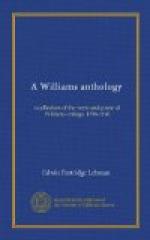That such a letter cannot be written with white gloves goes without saying. The first requisite is freedom from stiffness. The realm of good letters is a republic in which no man need lift his hat to another. It is hail-fellow well met, or not met at all. So when the humble address their superiors, or when children write to austere grandfathers, they suffer from an awkwardness of mental attitude which is the paralysis of all spontaneity. Before the indispensable ease can exist, certain relations of equality must be established. But there are some whose fountains of speech, in letters as in conversation, lie forever above the line of perpetual snow. They never thaw out. Bound by a sort of viscosity of spirits, that peculiar stamp of the Anglo-Saxon temperament, they are incapable of getting their thoughts and emotions under way; with the best will in the world, genuine warmth of feeling, minds stocked with information on all subjects, they are never fluent. The man with no ear must not hope to be a musician, nor the man with no fluency a letter-writer. Yet this is not all. You will find some at perfect ease in conversation who, touching pen to paper, exhibit the affected primness commonly ascribed to the maiden aunt. They have not learned that this is a place where words must speak for themselves without comment of inflection, gesture of the hand, or interpreting smile. Here to be unaffected one must take thought. As on the stage a natural hue must be obtained by unnatural means, so in the writing of letters one must a trifle overdo in order to do but ordinarily. A word which rings on the lips with frank cordiality will stare coldly from the written page and must be heightened to avoid offense. This is a license requiring the exercise of moderation and the utmost tact. Not all expressions suitable for conversation need reinforcement in black and white. In speaking one frequently raps out a phrase whose literalness one’s eyes warn the listener to question. These must be toned down or glossed. An example of the toned down variety, which illustrates as well men’s fondness for assailing their friends with opprobrious epithet, is offered by Darwin when he writes, “I cannot conclude without telling you that of all blackguards you are the greatest and best.” If Darwin had been talking face to face with Fox, he would doubtless have called him a blooming blackguard outright.
A writer in a journal of psychology points out the strong psychic link existing between a certain short expletive of condemnation and a refractory collar-button. These words seem to come at times charged with the very marrow of the mind, and, if the letters of a man who occasionally indulges in them be wholly purged of them, the letters lose one of their most distinctive characteristics. The point to be made is, that the personal word is all-important, that till the fact is related to the writer, it is dead. If we want news, we can consult the dailies; but in letters facts are little, ideas about facts everything. That is to say, all events, especially the more trifling, should be shown through the colored glass of the writer’s personality. What concerns you is not what happened, but what relations the happening bears to you and your correspondent.




